WHO welcomes Italy’s new contribution in support of the cholera outbreak in Syria
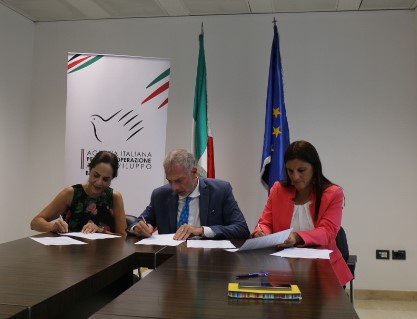 Dr Iman Shankiti, a.i. WHO Representative in Syria, Massimiliano D’Antuono, Chargé D’Affaires of the Italian Embassy in Damascus and Alessandra Piermattei, AICS Director for Lebanon and Syria26 October 2022, Damascus – Lending a humanitarian hand to protect the lives of the people of Syria, the Government of Italy has generously donated € 500 000 to support WHO’s response to the cholera outbreak in the country. This new fund aims at strengthening the capacity of 5 laboratories in affected governorates, thus enabling them to activate bacteriological testing and rapidly detect and identify epidemic diseases and outbreaks in hard-to-reach and high-risk areas.
Dr Iman Shankiti, a.i. WHO Representative in Syria, Massimiliano D’Antuono, Chargé D’Affaires of the Italian Embassy in Damascus and Alessandra Piermattei, AICS Director for Lebanon and Syria26 October 2022, Damascus – Lending a humanitarian hand to protect the lives of the people of Syria, the Government of Italy has generously donated € 500 000 to support WHO’s response to the cholera outbreak in the country. This new fund aims at strengthening the capacity of 5 laboratories in affected governorates, thus enabling them to activate bacteriological testing and rapidly detect and identify epidemic diseases and outbreaks in hard-to-reach and high-risk areas.
“The Italian contribution will enable WHO to support health authorities to meet the increasing health needs of the affected populations who have been repeatedly impacted by health emergencies, the latest of which is the cholera outbreak,” said Dr Iman Shankiti, a.i. WHO Representative in Syria. “Supporting labs, at the peripheral level, and enabling them to perform cholera testing, is crucial for reducing morbidity and mortality among Syrians, in addition to delivering a timely response to the impacted communities,” Dr Shankiti added.
“Italy stands together with Syrian people and is committed to supporting them in facing their emergencies and needs. This contribution is in line with our support to WHO in the country, following a contribution focused on COVID-19 testing and another on the operationalization of COVID-19 vaccines, together with the distribution of around 4 million vaccines early this year,” said Massimiliano D’Antuono, Chargé D’Affaires of the Italian Embassy in Damascus.
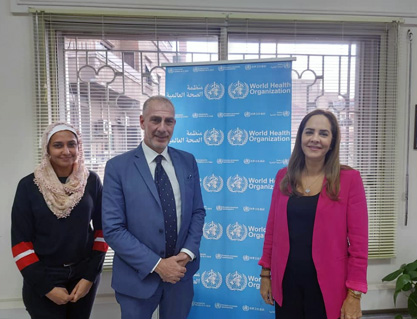 Dr Faiqa Kassim Ebrahim, Incident Manager, Cholera, Massimiliano D’Antuono, Chargé D’Affaires of the Italian Embassy in Damascus and Dr Iman Shankiti, a.i. WHO Representative in Syria“The contribution aims at preventing the spread of cholera more than has already been achieved. Providing timely sanitation supplies is critical to prevent and control the transmission of cholera and waterborne diseases. Only by providing for the tools, we can make sure that the country will be able to face future health emergencies," added Alessandra Piermattei, AICS Director for Lebanon and Syria.
Dr Faiqa Kassim Ebrahim, Incident Manager, Cholera, Massimiliano D’Antuono, Chargé D’Affaires of the Italian Embassy in Damascus and Dr Iman Shankiti, a.i. WHO Representative in Syria“The contribution aims at preventing the spread of cholera more than has already been achieved. Providing timely sanitation supplies is critical to prevent and control the transmission of cholera and waterborne diseases. Only by providing for the tools, we can make sure that the country will be able to face future health emergencies," added Alessandra Piermattei, AICS Director for Lebanon and Syria.
This new donation will enhance the capacity of 5 microbiological laboratories in the governorates of Damascus, Lattakia, Tartous, Homs, and Hama, which have been functioning with limited capacity to conduct confirmatory testing due to a shortage of essential equipment and testing tools. The fund will also enable the establishment of 5 new laboratories in other governorates without existing testing capacity, including Aleppo and Deir-ez-Zor, where the majority of cholera cases are reported.
On 22 October 2022, the Syria Ministry of Health reported a cholera outbreak in 13 of 14 governorates with a total of 44 deaths and 942 confirmed cases. Challenges on the ground are rapidly evolving due to the over-stretched health system, limited availability and accessibility of safe water, as well as an socioeconomic decline across the country.
WHO supports national polio, measles, and rubella vaccination campaign in Syria
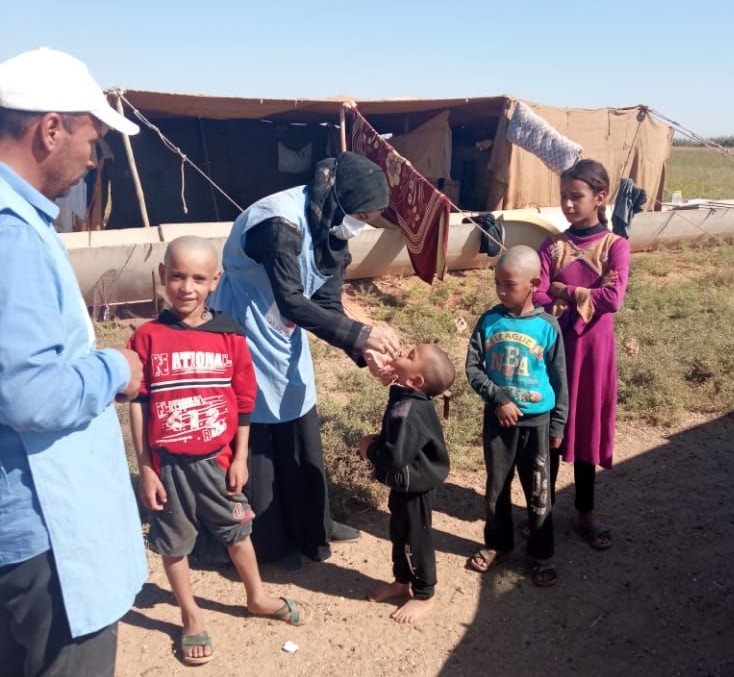 12 October 2022, Damascus – With support from WHO, UNICEF and Gavi, the Vaccine Alliance, the Ministry of Health in Syria has launched a polio, measles and rubella vaccination campaign across the country. The 10-day campaign, which began on 9 October 2022, aims to vaccinate 2.4 million children under the age of 5 in all Syrian governates, regardless of their vaccination status, with a special focus on camps and informal settlements.
12 October 2022, Damascus – With support from WHO, UNICEF and Gavi, the Vaccine Alliance, the Ministry of Health in Syria has launched a polio, measles and rubella vaccination campaign across the country. The 10-day campaign, which began on 9 October 2022, aims to vaccinate 2.4 million children under the age of 5 in all Syrian governates, regardless of their vaccination status, with a special focus on camps and informal settlements.
“Keeping Syria polio-free has been a major priority over past years for WHO and partners, and we are exerting all efforts to maintain this achievement,” said Dr Iman Shankiti, WHO Representative in Syria, adding that, “The measles and rubella campaigns are equally important to prevent the occurrence of any outbreaks, increase the immunity of children under 5 years, and minimize the risk and exposure to measles, which began showing rising trends of late.”
Despite the socioeconomic challenges facing the country, more than 1034 health facilities and 793 mobile medical teams, supported by nearly 9500 health workers, are being mobilized to reach all children, especially in hard-to-access and remote areas.
WHO-supported vaccination mobile teams are also present in camps and informal settlements – particularly in northeast Syria – targeting over 28 000 children under 5 every 1-2 months. In 2021, 2 vaccination campaigns were conducted through a national immunization week, while another campaign in 2022 reached around 775 651 children under 5.
Prior to the campaign, WHO backed the Ministry of Health with planning, supervision, and capacity-building training to equip the health workers with updated information and guidance. WHO is also covering the campaign’s operational costs of transporting both the vaccines and the vaccinators. After the campaign, WHO will provide the needed support for the independent post-campaign evaluation.
“Despite the many challenges on the ground, WHO is working closely with all partners to ensure the sustainability of the Expanded Programme on Immunization activities so that every last child in Syria is protected and vaccinated,” Dr Shankiti said.
In 2022, the number of confirmed measles cases increased from 22 to over 100 cases due to the accumulation of susceptible children who hadn’t received routine vaccines. WHO is supporting 210 mobile teams, and more than 80 outreach sessions for remote areas, targeting about 48 000 children every month.
Since the conflict erupted in Syria more than a decade ago, humanitarian needs have continually increased, with new complexities adding to the burden of the Syrian people – already fatigued by the ongoing crisis and disease outbreaks. Now, more than ever, the children of Syria need our support to ensure the continuous implementation of immunization activities so that no child is at risk of vaccine-preventable disease.
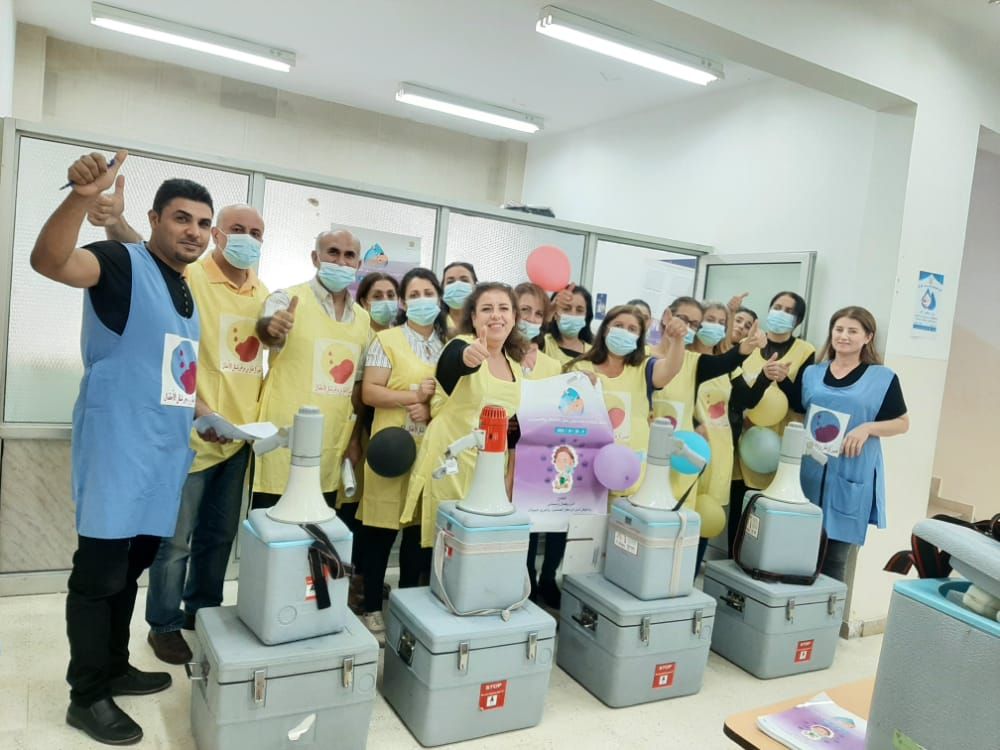
WHO supports health referrals in northeast Syria
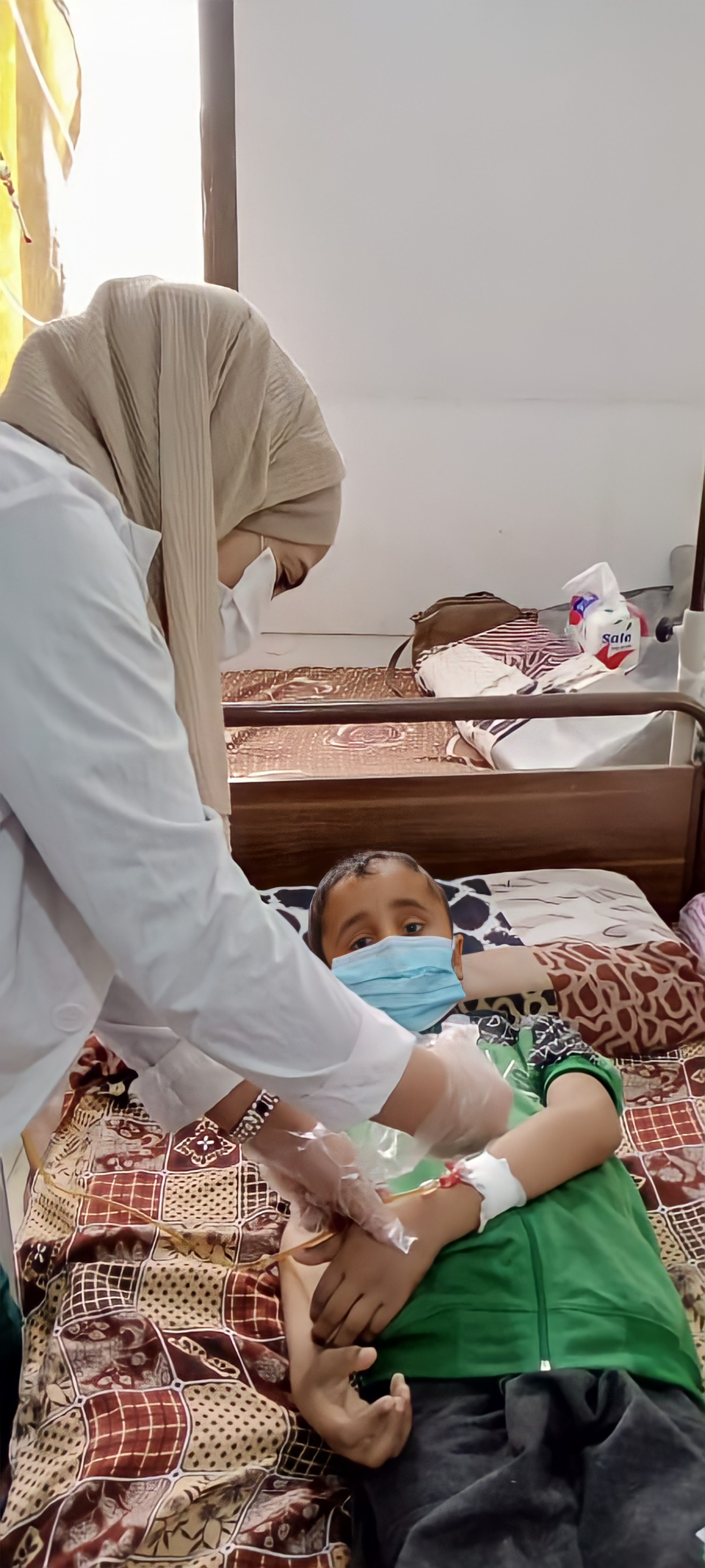 Saber, a 9-year-old boy from Deir-ez-Zor governorate is the only son of a vulnerable family that was forced to leave its village in search of security and shelter.Damascus, 6 October 2022 – The need for humanitarian aid in northeast Syria is constantly growing due to ongoing hostilities that continue to claim fatalities every day, as well as severe water shortages impacting health and livelihoods and exacerbating people’s suffering. In addition to treating children with malnutrition in northeast Syria, monitoring the quality of drinking-water, covering the operational costs of COVID-19 vaccination campaigns and the Essential Programme on Immunization activities, the continuous provision of medicines, equipment, personal protective equipment for health care workers, consumables, and medical supplies – through both crosslines deliveries, road and air shipments – WHO’s humanitarian health response in northeast Syria also includes supporting the referral health system.
Saber, a 9-year-old boy from Deir-ez-Zor governorate is the only son of a vulnerable family that was forced to leave its village in search of security and shelter.Damascus, 6 October 2022 – The need for humanitarian aid in northeast Syria is constantly growing due to ongoing hostilities that continue to claim fatalities every day, as well as severe water shortages impacting health and livelihoods and exacerbating people’s suffering. In addition to treating children with malnutrition in northeast Syria, monitoring the quality of drinking-water, covering the operational costs of COVID-19 vaccination campaigns and the Essential Programme on Immunization activities, the continuous provision of medicines, equipment, personal protective equipment for health care workers, consumables, and medical supplies – through both crosslines deliveries, road and air shipments – WHO’s humanitarian health response in northeast Syria also includes supporting the referral health system.
Saber, a 9-year-old boy from Deir-ez-Zor governorate is the only son of a vulnerable family that was forced to leave its village in search of security and shelter. The family was displaced multiple times until it ended up in the Areesha camp in northeast Syria. “We used to live in a tattered tent under harsh weather conditions. We walked through the desert in the heat with no food for days on end. We experienced a lot of pain, hunger, fear, and displacement until we finally settled in the Areesha camp,” Saber’s mother recounted. “A few months after Saber’s birth, he had been diagnosed with a brain cyst requiring surgery – an expensive procedure which we couldn’t afford,” the mother added.
In the camp, the child’s health deteriorated a little more each day. He began suffering vision impairments and severe headaches. Following examination by a mobile medical team, the child was referred to the WHO-supported Al-Hikmeh Hospital in Al-Hassakeh where he was admitted and started his treatment journey. Saber underwent surgery and received the needed medical interventions; his health improved gradually until he was discharged from the hospital, fully recovered.
As per 2022 estimates, more than 2.7 million people in the 3 governorates of northeast Syria require humanitarian assistance, including approximately 697 106 internally displaced persons and refugees who represent 90% of the referrals received and treated through the 55-bed Al-Hikmeh Hospital.
“Health needs across northeast Syria remain dire. The functionality of health facilities and availability of health human resources remain critically lacking with health systems unable to respond to the increasing needs and gaps,” said Dr Iman Shankiti, WHO Representative in Syria. “WHO is working with all partners to address wider health needs and to ensure that essential health services remain available in northeast Syria,” she added.
In 2021, thanks to kind donations from Australia, the Foreign, Commonwealth and Development Office (FCDO), Norway, and the Office of U.S. Foreign Disaster Assistance (OFDA), WHO’s agreement with Al-Hikmeh Hospital enabled the provision of trauma, secondary, and emergency care services to 8774 referred patients –mostly women and children – of whom 2356 were from the Areesha camp.
Based on the latest data of the Health Resources and Services Availability Monitoring System (HeRAMS), out of 16 public hospitals in northeast Syria, only one is fully functional, 8 are partially functional, and 7 are not functional, while only 2 districts meet the emergency threshold of at least 22 health care workers per 10 000 population, making the lack of health human resources a chronic challenge.
Norway lends first-hand support to WHO in response to the cholera outbreak in Syria
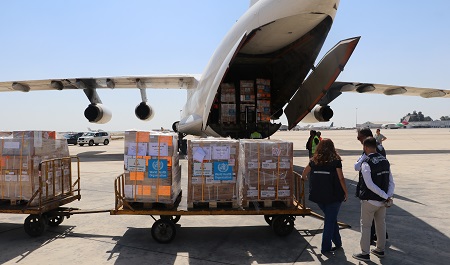 Responding to the cholera outbreak in Syria, WHO delivered a 60-tonne shipment of cholera kits, oral rehydration solutions, rapid diagnostic tests, and medical supplies for intravenous (IV) rehydration treatment, in addition to chlorine for water purification4 October 2022, Damascus – Funding from Norway has enabled WHO to immediately respond to the cholera outbreak declared by the Syrian Ministry of Health on 10 September 2022 and ensure the delivery of supplies for thousands of people who are infected or at risk.
Responding to the cholera outbreak in Syria, WHO delivered a 60-tonne shipment of cholera kits, oral rehydration solutions, rapid diagnostic tests, and medical supplies for intravenous (IV) rehydration treatment, in addition to chlorine for water purification4 October 2022, Damascus – Funding from Norway has enabled WHO to immediately respond to the cholera outbreak declared by the Syrian Ministry of Health on 10 September 2022 and ensure the delivery of supplies for thousands of people who are infected or at risk.
“Syria’s health system has been repeatedly strained through multiple concurrent emergencies and challenges that continue to affect the availability and quality of health services across the country. More than half of the health facilities in Syria remain partially functional or destroyed,” said Dr Iman Shankiti, WHO Representative in Syria. “This support from Norway is a critical contribution to WHO's work and plays a key role in strengthening our response to the current outbreak while addressing wider health needs,” Dr Shankiti added.
Using flexible funds from Norway that allow WHO to meet the urgent needs as they arise, WHO was able to procure the needed life-saving treatments from the local market in the first days of the cholera outbreak and deliver a 60-tonne shipment of cholera kits, oral rehydration solutions, rapid diagnostic tests, and medical supplies for intravenous (IV) rehydration treatment, in addition to chlorine for water purification.
The shipments, airlifted from WHO’s logistics hub in Dubai, will enable health authorities and partners to provide treatment for 2000 severe cholera cases and almost 190 000 cases of diarrhoea with mild symptoms. In Aleppo governorate, WHO distributed more than 250 000 chlorine tablets, and trained around 100 health care workers on surveillance, infection, prevention and control measures, as well as case management. WHO is also working on expanding the capacity of cholera treatment units by delivering 30 patient beds and needed accessories.
After a decade of zero cholera cases in Syria, on 1 October 2022, the Ministry of Health reported a cholera outbreak in 11 governorates (Aleppo, Hassakeh, Deir Ez-Zor, Ar-Raqqa-Latakia, Homs, Hama, As-Sweida, Daraa, Qunitera, and Damascus) with a total of 36 deaths and 524 confirmed cases.
The situation is evolving alarmingly in affected governorates and expanding to new areas. WHO is following up closely with all health partners to contain the outbreak and prevent further spread of infection through enhancing cholera surveillance in high-risk areas at health facilities and community levels, promoting community awareness, including access to sanitation and personal hygiene practices, providing chlorination for drinking-water sources, securing rapid diagnostic tests, and providing needed treatments.
Norway has been a long-standing partner of WHO, continuously working to strengthen emergency response activities to meet the needs of the most vulnerable populations in Syria.


